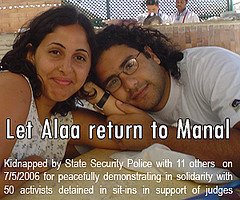Alaá and Human Rights First campaigns for Sharqawi, ash Shaér and all the others imprisoned activists
I was mowed, while reading Alaá´s account on his meeting in the courtroom, with the young Muslim brothers, who were detained while on summer holiday in Marsa Matrouh. Their sincere happiness on hearing the news of Aláa´s release, and he´s likevise reciprocal show of solidarity with them in their ordeal, knowing exactly what they could excpect for the next 15 days-6 months, shows that regardless of your different views on politics, society e.t.c you still have so much more in common, than what separates you.
Just as Alaá is pointing out, it´s not only Sharqawi and ash Sháer, it´s the remaining 600 or so activists, all in prison for the same reason. This is our challenge.
Please take a minute and sign the letter from Human Rights first!
I will leave you with a part of what Aláa wrote:
¨while I was waiting to hear the prosecutor's verdict in the cell they let in around 35 young men who where in a very good mood, they made alot of noise, they joked about the bags of munchies and sweets they have with them, turned out they where a group of ikhwan from Alexandria who went for a summer trip in Marsa Matrouh, a perfectly harmless social activity full of singing and dancing and football, but state security decided it was a training camp and arrested them all.
try to imagine being arrested and facing anything between 15 days and 6 months of detention because you went to the seaside with 30 of your best friends.
they where from this new breed of islamists that reads blogs, watches al jazeera, sings sha3by songs, talks about intense love stories and chants "down Mubarak". and being young most of them did not have any experience with prison before. waiting to know whether they'll get 15 or 45 days detention for starters, waiting to know whether they'll be sent to one of the just horrible prisons or of the too horrible prisons, and in the middle of it all we got the news that I would be released the next day.
and all of sudden they transformed from just ikhwanis into comrades! they hugged me, they clapped, they shook my hands, they laughed and they were genuinely happy for my release. they felt and expressed solidarity and they gave me the one happy memory that would help me live through 14 hours of hell.
but the only thing I could give them was to chant "ألف تحية للأخوان ... ألف تحية للأخوان" and shed a happy tear.¨
Sharqawi, ash Shaér, Alaá, Muslim Brotherhood, Ikhwan, arrests, democracy activists, Egypt









